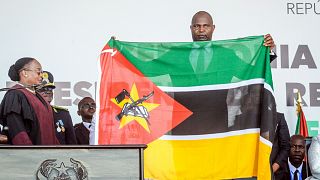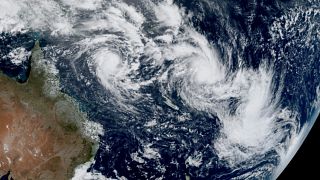Mozambique
Mozambique is playing a trailblazing role in a flagship global initiative to ensure that everyone is protected by early warnings of life-threatening weather-related hazards which are becoming more extreme because of climate change.
At a ministerial-level ceremony in the capital Maputo, Mozambique, President Filipe Jacinto Nyusi launched an ambitious national roadmap to achieve Early Warnings for All by a target of the end of 2027 and also announced a significant new investment to improve basic weather and climate observations which underpin early warnings.
“Mozambique is a country that lives under permanent threat of disasters, especially those caused by extreme natural phenomena, with floods, cyclones and droughts being the most frequent. When these adverse events occur, they leave a trail of destruction characterized by human loss and material and environmental damage or serious implications for society and our economy,” said Mr Nyusi, who is an African Union Champion on Disaster Risk Management.
Situated on the southeast African coast, Mozambique is regularly battered by tropical cyclones that sweep across the Indian Ocean and by related coastal and inland flooding. Over 60% of the population resides in low-lying coastal areas, heavily dependent on rain-fed agriculture, increasing the risk to infrastructure and livelihoods. The impacts of climate change have intensified these challenges, leading to significant losses and damages.
“Much can be done to reduce the loss of human life and greater harm. Advance notice helps us to do this, to protect ourselves,” the president told the ceremony. Flanked by ministers and senior United Nations and donor government representatives, he applauded the work of WMO and Mozambiques’s National Meteorological and Hydrological Service.
“Mozambique has made great strides towards Early Warnings for All and has a proven track record in saving lives. For instance, Tropical Cyclone Idai in March 2019 led to 603 deaths and cost US$ 3 billion. Record-breaking Tropical Cyclone Freddy in early 2023 claimed 183 lives and US$ 176 million in economic losses,” said WMO Secretary-General Celeste Saulo.
“Together, we can build a future where Mozambique is not only prepared for hazardous event but resilient against them. Let us come together with one vision and one goal: to protect people, livelihoods and the future,” she said.
“Early warnings work. They must work for everyone,” said Celeste Saulo.
Mozambique has already taken big strides in climate adaptation. The Early Warnings for All initiative, spearheaded by United Nations Secretary-General António Guterres, is being effectively integrated into Mozambique. It was officially launched at a national workshop in November 2023 and is being rolled out with the support of the National Institute for Disaster Management and the National Institute of Meteorology, in close collaboration with the National Communication Institute and the Mozambican Red Cross and with the UN Resident Coordinator’s office.
The EW4All Roadmap provides an overarching framework for a coherent and consolidated Multi-Hazard Early Warning System program which could be embedded into Mozambique’s five-year development plan.
It seeks to embrace the whole of meteorological value chain, from collecting weather and climate observations data, over to better forecasts, improved early warning systems up to better informed climate adaptation plans.
Systematic Observations Financing Facility
There are many challenges:
To date, the Mozambique National Institute of Meteorology has relied on governmental budgets and international development projects to fund its observation network. However, limited resources have hindered network accessibility and maintenance.
Currently, Mozambique lacks surface weather stations that are compliant with the mandatory international WMO standard, the Global Basic Observing Network (GBON).
This, fortunately, is set to change thanks to an investment of US$ 7.8 million from the Systematic Observations Financing Facility (SOFF) to install six new land surface stations, upgrade 15 existing stations, and establish four upper-air stations.
The SOFF investment seeks to align Mozambique with the Global Basic Observing Network standards. Data collected with the new and upgraded stations will feed into important weather and climate services, including early warning systems.
“This is a timely and much needed investment, which will yield high returns. The country lost 75% of its monitoring stations during flooding in 2000 and has been striving to recover through modernization and expansion ever since then,” said Celeste Saulo in a video statement at the high-level event.
“SOFF's investment will contribute to the government's ambitious program of establishing One District One Weather Station. New or updated surface and upper-air stations and technical assistance will improve national meteorological and hydrological services, thereby enhancing forecasting and early warning systems that save lives and livelihoods,” she said.
Mozambique is one of the first countries that have moved into the SOFF Investment phase.
The South African Weather Service, serving as the SOFF peer advisor, will provide guidance, while the World Food Programme (WFP), as the Implementing Entity, will leverage its field presence and ongoing projects to complement investments in early warnings and forecast-based finance.
This collaboration aims to target easy fixes of stations previously funded by initiatives like the Pilot Programme for Climate Resilience, Nordic Development Fund, and World Bank, which faced lack of maintenance due to resource constraints.
The National Institute of Meteorology will be better equipped to support government initiatives to bolster national resilience and disaster preparedness.
Climate Risk and Early Warnings Systems initiative:
The Climate Risk Early Warning Systems initiative (CREWS) has also played a crucial role in building resilience in Mozambique.
Under CREWS, WMO and the World Bank started working closely together after Cyclone Idai in 2019. The joint project provided international expertise for the Government-led Disaster Risk Management Program, particularly in developing and implementing integrated early warning systems.
An upcoming CREWS Steering Committee meeting will discuss a follow-up project of US$ 5.5 million to build on this foundation and expand efforts in Mozambique and the broader southern African region.











Go to video
At least 300 people killed during the post-election violence in Mozambique
01:40
Schools in Mayotte prepare to reopen after devastating Cyclone Chido
01:03
Mozambique: Daniel Chapo sworn in as president
Go to video
Mozambique opens new parliament amid strikes and protests
01:22
Mozambique: Mondlane's return and post-election tensions
00:55
Mozambique opposition leader Venancio Mondlane returns from exile